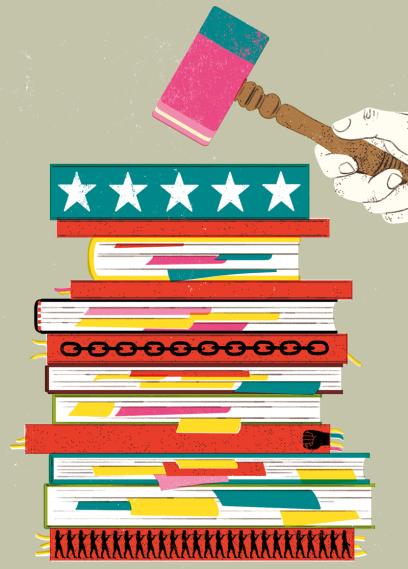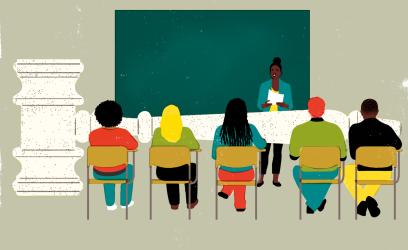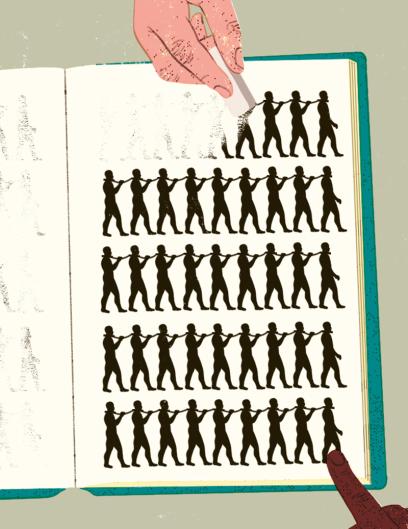The new volume of the Journal of Academic Freedom engages with recent political challenges to academic freedom, which have mobilized the antidemocratic notion that academic knowledge—whether in the United States or elsewhere—can be scripted by outside agencies such as a legislative body, a board of trustees, a ministry, or a governmental commission. The resulting laws openly vilify “histories that call attention to the historical realities of genocide, slavery, oppression, and dispossession,” and their advocates have deployed “many disinformation tactics, including the production and dissemination of a counterfeit version of critical race theory (CRT).”1 We explicitly sought to investigate the impact that this exaggerated form of prescriptive historiography is having on K–12 schools and college and university campuses. The contributors to this volume have offered a chilling panorama of the ongoing struggle between legitimate scholarship and nostalgic propaganda—between informed discourse seeking to enlighten and expand knowledge about past and present and dogmatic censorship.
The open season on CRT and the call for a “patriotic history” have become key components in the political agenda of right-wing US ethnonationalists seeking to script, through memory laws, a lopsided account of the country’s history. This censoring movement is at the center of a renewed culture war in which the results of research and the activities of academics are monitored and judged as “anti-American” whenever they do not fit the narrow views of those seeking an epic account of American exceptionalism.
Over the past few years, an inquisitorial impulse reminiscent of the 1940s and ’50s McCarthyite House Un-American Activities Committee (HUAC) has been unleashed on public libraries, schools, colleges, and universities. The “inquisitors” seek to identify books, classes, syllabi, and lectures that appear to threaten or undermine the tale of America’s greatness. Much like HUAC ironically branding its victims as “Un- American,” the banning of books and the censoring of academics carried out by the latest authoritarian nationalists has also been described as deeply flawed and un-American, and over 150 US academic associations signed a June 2021 statement opposing such legislation.2 Encroachment on academic freedom and on freedom of speech often takes the form of a blanket condemnation of CRT, critical theory, critical thinking, and any cultural product deemed “subversive,” with the accusers needing little evidence to substantiate their suspicions and allegations as they claim full proprietorship over the nation’s essence. In this respect, today’s inquisitorial impulse follows dictionary definitions of McCarthyism as (1) “the practice of publicizing accusations of political disloyalty or subversion with insufficient regard to evidence” and (2) “the use of unfair investigatory or accusatory methods in order to suppress opposition.”3 Lack of evidence, on the one hand, and the political aim to “suppress opposition,” on the other, seem to sum up well the current movement to repress “identity politics” and any other discourse that may counter the white supremacist account of American “greatness.”
In the stormy closing days of the divisive Trump administration, the President’s Advisory 1776 Commission called for an active program of censorship of any critical account of US history. The stated purpose of the advisory committee was to enshrine “patriotic education in our nation.” It published its 40-page report in the fateful month of January 2021, just two days before the inauguration of Joe Biden and less than two weeks after the unpatriotic January 6 insurrection at the US Capitol. The report is a mixture of insipid summaries of the founding principles of the republic followed by a tirade—in an unsigned appendix—disparaging “identity politics” and equal opportunity programs. There is no citation apparatus, and the work has been described by the executive director of the American Historical Association, Jim Grossman, as a “hack job” and as “outright lies” by others.4 As a piece of academic writing, it does not meet customary expectations even for undergraduates.
Nonetheless, as a disturbing but predictable ripple effect of the 1776 Commission and the culture war fed by Trump and many of his supporters, Republican state legislators across the United States have introduced dozens of new laws targeting curricula related to race and racism since the spring of 2021. A number of states have already passed laws or established administrative requirements to restrict the teaching of US history, while others are set to follow suit. This is a form of doublespeak, an Orwellian limitation on speech in the name of free speech.
Gag orders, such as bans on teaching critical race theory or Florida’s “Stop WOKE Act” signed into law in April 2022, are aggressive efforts to restrict education about racism, bigotry, and US history. Under the guise of prohibiting students from exposure to “divisive concepts,” these politically orchestrated initiatives—although the details vary by state—seek to politicize curriculum, punish faculty who exercise academic freedom, and demonize teachers, schools, colleges, and universities. At their core, these gag orders and legislative bans infringe on the right of faculty to teach the results of current research and the right of students to learn.
Academic Freedom Is Unlike Free Speech
Academic freedom is informed speech, and as a recent book by professors Michael Bérubé and Jennifer Ruth asserts, “It’s not free speech.”5 Politicians, pundits, and public bullies are not necessarily held to rigorous standards of expertise for their opinions, claims, and assertions. They may exercise free speech, but it is not academic freedom. Opinionated rants are not the same as scholarly publications or a curriculum that must adhere to standards and expectations among a field of experts. This is what separates the claims of scientists, historians, and literary critics from opinions exercised as free speech. The former are bound to peer review at multiple levels and subject to refutation and rebuttal, contributing over time to a body of knowledge established and sustained with checks and balances. Formed through a recursive vetting process, legitimate academic claims arise in the context of scholars and scientists exercising academic freedom. A claim is not “right” because someone has the loudest mic or the most money or the greatest power but because their argument maintains validity within a larger community of people whose claims are also subject to scrutiny and vetting. Teachers trained in a field of expertise draw from that body of vetted knowledge. In this way, knowledge produced by and accountable to academic freedom should not be dismissed as mere opinion. This credibility is what makes academic freedom so central to the functioning of a free and democratic society, and distinct from free speech. The exercise of academic freedom is both a guarantee and a buffer against the routine harm that comes to democracy, social inclusion, and public knowledge through belligerent partisan attacks, calculated and profit-seeking manipulations of opinion, or deliberate disinformation campaigns.
It warrants repeating: academic freedom does not thrive under authoritarian governments.6 Routinely we witness the effects of censorship in crushing critics, smothering dissent, and forcing scientists and scholars to flee authoritarian states.7 Certain historical and social conditions are necessary for academic freedom to persist and flourish, which in turn creates the space for innovative inquiry, exploration, and dynamic scientific and academic communities. The Journal of Academic Freedom and the AAUP more broadly have contributed to greater fluency in our collective understanding of the connections between and among history, democracy, and academic freedom.
To situate academic freedom in the institutional milieu of a free society is not arbitrary. It is instead a recognition of the contingency of academic freedom, much as any variant of national democracy is also historically contingent. Consequently, the practice of academic freedom by scholars, scientists, and educators is imbued with and constrained by social and political struggles over knowledge, memory, and identity. As the articles in this volume demonstrate, academic freedom within a state or nation is not static; it is an institutionalized value system tenuously built into modern universities, colleges, and a larger, often contested, system of education.8
Democracy and Academic Freedom
One of the most underappreciated factors necessary for a minimally functioning democracy is a civil society with a robust knowledge sector. Knowledge sectors include a variety of institutions and organizations, from nonprofits to formal public and private schools, colleges, and universities. Within that sector, educational institutions must not be hampered by violence, institutionalized discrimination, or interference from powerful political or economic interests. This is why colleges and universities and their accrediting bodies must protect academic freedom from outside political, ideological, or economic interests. Of course, when powerful political or economic interests attempt to shape or control the agenda of educational institutions, academic freedom is at risk of being hollowed out. The current wave of conservative reaction is about silencing critics and censoring honest discussions about bigotry, race, and racism. More starkly, violence or threats of violence target teachers and faculty, especially underrepresented faculty and those who teach topics that white nationalists want to silence. Teachers and faculty encounter these threats in the form of doxing, graffiti, and vandalism, which further erode their sense of safety and trust—and, ultimately, the promise of inclusive teaching, learning, and dialogue. The oppressive shadows of bigotry, discrimination, bullying, and inequity similarly threaten trust and safety. Democracy suffers when such assaults hamper or encumber the knowledge sector in civil society. Democratic societies require a highly open flow of information, discourse, and perspective-taking, which in turn facilitate the conditions for accountability with checks and balances. The free press is obviously a part of this equation. But educational institutions and nonprofits play a key role in bolstering the connective tissues between and across communities in a larger deliberative, complex, and inclusive society.
The legislative and political incursions into the realm of academia reviewed in this volume’s 13 articles clearly usurp the rights of academics to freely and ethically conduct research and to share it through their teaching. If allowed to continue, the recently inaugurated racial censorship and its legislated limitations on knowledge production will have a lasting impact on generations of Americans who will grow up ill-prepared to live in a multicultural republic, uninformed about its complex histories, and unable to truly strengthen its civic bonds.
Michael C. Dreiling is a professor of sociology and department head at the University of Oregon, where he specializes in political and environmental sociology. He served two terms as president of AAUP Oregon and three terms as the inaugural president of United Academics at the University of Oregon from 2013 to 2018. From 2014 to 2020, he worked alongside allies and faculty activists to help unionize three additional bargaining units in Oregon. Pedro García-Caro is an associate professor of Spanish at the University of Oregon, where he specializes in transatlantic cultural relations between the Americas and Spain and previously directed the Latin American Studies program. He served for 10 years in the University of Oregon Senate and served as secretary and vice president for faculty governance and academic freedom of AAUP Oregon. He was appointed as a 2022–23 provost fellow for academic freedom.
Endnotes
1. For a discussion of critical race theory, see R. Delgado, J. Stefancic, and A. Harris, Critical Race Theory: An Introduction, 3rd ed. (New York: New York University Press, 2017); K. Crenshaw, “Twenty Years of Critical Race Theory: Looking Back to Move Forward Commentary: Critical Race Theory: A Commemoration: Lead Article,” Connecticut Law Review 43, no. 5 (2011): 1253–1352; and K. Crenshaw, “Unmasking Colorblindness in the Law: Lessons from the Formation of Critical Race Theory,” in Seeing Race Again: Countering Colorblindness Across the Disciplines, ed. K. Crenshaw et al. (Oakland: University of California Press, 2019), 52–84.
2. American Association of University Professors, “Joint Statement on Efforts to Restrict Education About Racism,” June 16, 2021, aaup.org/news/joint-statement-efforts-restrict-education-about-racism.
3. American Heritage Dictionary of the English Language, 5th ed. (Boston: Houghton Mifflin Harcourt, 2016).
4. G. Brockell, “’A Hack Job,’ ‘Outright Lies’: Trump Commission’s ‘1776 Report’ Outrages Historians,” Washington Post, January 20, 2021.
5. M. Bérubé and J. Ruth, It’s Not Free Speech: Race, Democracy, and the Future of Academic Freedom (Baltimore: Johns Hopkins University Press, 2022).
6. D. Dubrovsky and K. Kaczmarska, “Authoritarian Modernisation and Academic Freedom: The Contradictions of Internationalisation and ‘Pockets of Effectiveness’ in Russian Higher Education,” Transtext(e)s Transcultures / 跨文本跨文化 / Journal of Global Cultural Studies, no. 16 (December 2016): 1543; and J. Scott, Knowledge, Power, and Academic Freedom (New York: Columbia University Press, 2019).
7. Scott, Knowledge, Power.
8. Scott, Knowledge, Power.
[Illustrations by Sonia Pulido]



